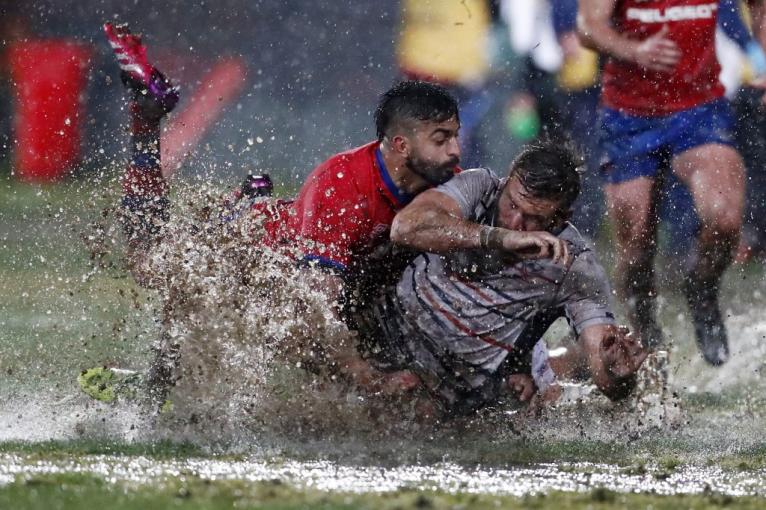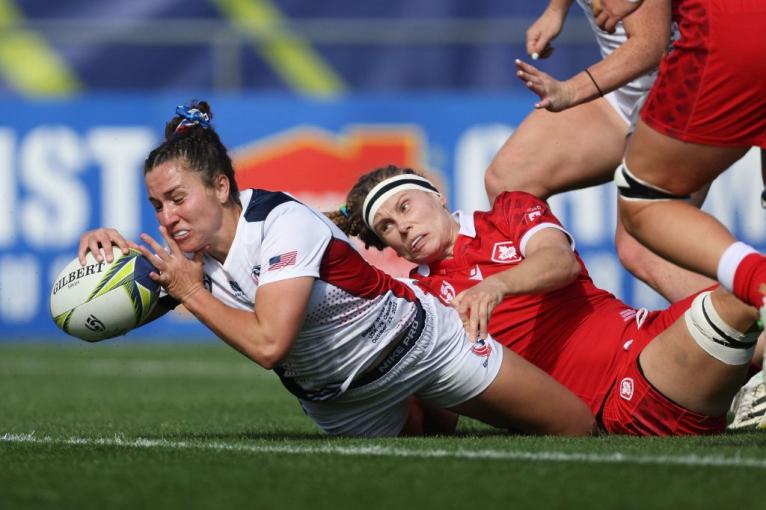It is a sunny yet windy day at StoneX Stadium in northwest London, and about forty players aged 15 to 18 are being put through their paces, hoping to one day earn a rugby scholarship to a US university.
The players, roughly split 70-30 between males and females, are running attack and defence drills, playing small-sided games, and vying to earn the chance to show their wares to a US university head coach.
First Sports USA is running the session – the last one of a week in which similar events have been held in Dublin, Dubai, and Sheffield – working to place rugby players in US colleges.
They are a Manchester-based company, with offices in London, Glasgow, Singapore, Melbourne, Dubai and Miami, founded in 2001 by Andrew Kean, a Scotsman who headed to the University of Cincinnati after his dreams of professional football with first Motherwell and then Heart of Midlothian withered.

Former Scotland internationals John Barclay and Ryan Wilson are two of the company ambassadors, and former Scotland and Rangers forward Ally McCoist is among their spokesmen.
“My job is to recruit the best athletically and academically prospective clients,” says Shona Kennedy, First Point USA’s rugby consultant and one of the coaches running around the StoneX.
“We have a recruitment day like today, and you have a trial. You look at the athletes for core skills – handling, catch-pass, communication, fitness, rugby IQ and game awareness and your decision making.
“I take a load of notes because I always like to provide feedback, and if you aren’t selected today, you can come back next year, but this is what you need to work on.
“If they do pass, I meet with them in person and we talk about academics, which is really important. The better you do academically the more scholarship you’ll get and the better you’ll do with degrees. Then I’ll look at their footage because what I see today is only a snippet and I want to see them play in a game.”
It is an emerging sport, but now is the most amazing time to be involved in rugby in the US, because they are hosting the World Cups of 2031 and 2033.
Kennedy is perfectly placed to explain what the experience of studying and playing rugby in the States is like, as well as what is required. The Irish native, who comes from a Gaelic football family, was late to rugby but “tagged along” to a Westport Bulls match where the bug bit and from where she earned a call-up from Connacht.
A few years on she impressed during a First Point USA trial in Dublin and earned a place at Central Washington University in Ellensburg, a rodeo town just over 100 miles southeast of Seattle. She graduated with a degree in sports psychology, and fantastic memories of her time Stateside.
“The earlier you start the better,” she says. “We always say it is an 18-month process by the time you do trials, meet, talk about academics, get footage and then there’s an onboarding phase and that’s when we reach out to the coaches with the footage and their academics.
“The four things I always look for, and what I would say any student athlete should look for are location, financially what they can afford, what kind of degree they are looking to do, and what level of rugby they are looking to play, because there are all kind of divisions, so we can help make it happen.
“When I went over that is when rugby started breaking through, so I’d say the last five or six years (it has grown). It is an emerging sport, but now is the most amazing time to be involved in rugby in the US, because they are hosting the World Cups of 2031 and 2033.”
Across the Atlantic Trevor Locke, Lindenwood University’s women’s head coach, is among First Point USA’s client base. Lindenwood is a Division 1 rugby university, though that does mean anything up to eight hours on a coach for away fixtures, which considering their geographical location, is a regular thing.

Based in St Charles, Missouri, a city of just over 70,000 right in the centre of the Midwest, the women’s programme currently boasts three players brought in from First Point USA, as well as three international players – two American and one Dutch.
A former American footballer and wrestler in high school, he was another late arrival to rugby, and played through college and during his time as PE teacher. Three ACL injuries curtailed his playing career, and after he joined the Lindenwood coaching staff he progressed through the ranks until taking the top job in 2022.
“We love when we’re able to grab students from overseas who bring a wealth of knowledge with them. We have girls or players coming from Salt Lake, and we have this girl from Seattle and from Los Angeles and when you add that in with southern hemisphere girls from Australia and New Zealand, and their methodology and the way they attack, the way they defend, the way they view the game.“It just provides a melting pot for us where that different perspective really enhances everybody to see rugby through a different lens with consistently challenging viewpoints.”
Many of the parents in attendance at the StoneX, who said they’d be happy for their child to go to college in the States if it meant they continued to focus on their studies, will be pleased to know there is a strong focus on the academic side, with measures in place to ensure grades don’t slip.
“We say this pretty consistently: ‘Hey, you’re not here to be an athlete student. You are here to be a student athlete’,” Locke explains.
The money is going into the sport and the World Cup is going to be there, so if you get there while the game is still young you could be the big thing over there.
“We have an eligibility mark, if you’re below that you actually can’t play, so you have to actually conquer and achieve your job as a student anyway, just to be on the field.
“For us, it is everything because there is a very, very, very small percentage, if any, existing specifically for women’s rugby that are retiring based on their professional career. So, if you look at that, for us to push athlete over student is foolish and it’s short term, and it doesn’t actually achieve anything in the long run, especially when you’re concerned most about the person before the player.
“I care about education. I was a teacher before I was a coach. I do care about people becoming the best version themselves and following a passion. So, for us that is the first and foremost and will always be.”
“It was intense, I had a good time, and I learned a few new bits,” Otto Bennett, one of those running around Saracens’ home ground tells us.
Until the end of last season, the 18-year-old was part of the London Irish academy, but their demise meant he was let go and he now features for the RFU’s London South Central Academy.
While he admits being picked up by a Premiership club remains the dream, the chance to study and play across the Atlantic is a highly attractive proposition.
“I’m just trying to keep as many options open as possible and hopefully get something back from it,” he said.
“The dream is to get a Premiership contract and a lot of boys have done that, but the plan is to get as many doors open as possible. If the opportunity is there, it is once in a lifetime.
“The money is going into the sport and the World Cup is going to be there in 2031, so if you get there while the game is still young you could be the big thing over there. Well, that’s the dream.”
Back in Lindenwood, Locke is in no doubt with the USA hosting the men’s World Cup in 2031 and the women’s in 2033 a fire has been lit under USA Rugby, who not long ago were reeling from financial problems and the failure to qualify for France 2023.
With seven years to ensure the men’s side can make its mark in a country where other sports hog the public’s attention, and nine for the women, the focus has shifted to the USA U20s and U23s, with the aim those players are hitting their peak when the World Cup comes to town.
Furthermore, playing at university level is also likely to become a more common route into Major League Rugby (MLR), akin to the college football system which attracts huge crowds and is the final stepping stone to the National Football League (NFL).
“With World Rugby money coming in, over the next couple of years it will be telling,” Locke says. “As money is invested into rugby in the United States then age grade level rugby and a lot of the rugby pushing up into our national teams is actually run through the university setup because that’s where athletes go after they finish high school.
“Unlike most of the rest of the world, we have to use our universities as the mediator for those athletes who are 18 to 22, 23 years old, to push them into that national team duty. So, as we see an increase in investment and all the kinds of structures pushing into the United States over the next seven to nine years, there should be opportunity right now.
“The university setup can also push you and get you prepared to be an MLR player. The university has to become a buffer because not everybody is able to step out and be an MLR player. Plus, there’s only so many roster spots and there are a ton of rugby players in the United States.”
On 1 July 2021, the National Collegiate Athletic Association (NCAA) – the US university sports regulatory body – made a seismic change when it allowed college athletes to profit from their own NIL (name, image, and likeness).
It came after protests and pressure from the likes of basketball great Kareem Abdul-Jabar. The NCAA makes over $1billion annually, but banned its athletes from any money-making avenues, despite the massive profits they and the colleges made off their hard work.
While Kennedy points out rugby players aren’t yet at the level where Louisiana State University (LSU) gymnast and Sports Illustrated cover model Livvy Dunne makes $500,000 from one TikTok post, it does mean they can use their status to have create an extra form of income.

She adds while “it is a very intense lifestyle,” the facilities and staff make the experience worthwhile.
“I always say it isn’t for everyone and that isn’t to scare anybody. You are go, go, go, all the time and they expect you to be go, go, go all the time. You have to be a very self-disciplined, motivated, and organised person otherwise you are not going to succeed.
“Everybody wants you to succeed, but there’s no excuses. I liked that because it made me grow as a person. You have to speak up, or you’re going to get eaten alive. You’re almost forced to come out of your shell.
“It changed my life. I loved every second of it. There were days which were really tough and was really homesick. My coaches always said that you are guaranteed one thing when you come here, and that is an opportunity, and it is up to you if you want to take it or not.”



Comments
Join free and tell us what you really think!
Sign up for free